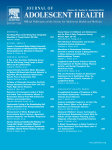Abstract:
PURPOSE: To test the long-term effects of a mass media intervention that used culturally and developmentally appropriate messages to enhance human immunodeficiency virus (HIV)-preventive beliefs and behavior of high-risk African American adolescents.
METHODS: Television and radio messages were delivered for more than 3 years in two cities (Syracuse, NY; and Macon, GA) that were randomly selected within each of the two regionally matched city pairs, with the other cities (Providence, RI; and Columbia, SC) serving as controls. African American adolescents, aged 14-17 years (N = 1,710), recruited in the four cities over a 16-month period, completed audio computer-assisted self-interviews at recruitment and again at 3, 6, 12, and 18-months postrecruitment to assess the long-term effects of the media program. To identify the unique effects of the media intervention, youth who completed at least one follow-up and who did not test positive for any of the three sexually transmitted infections at recruitment or at 6-and 12-month follow-up were retained for analysis (N = 1,346).
RESULTS: The media intervention reached virtually all the adolescents in the trial and produced a range of effects including improved normative condom-use negotiation expectancies and increased sex refusal self-efficacy. Most importantly, older adolescents (aged 16-17 years) exposed to the media program showed a less risky age trajectory of unprotected sex than those in the nonmedia cities.
CONCLUSION: Culturally tailored mass media messages that are delivered consistently over time have the potential to reach a large audience of high-risk adolescents, to support changes in HIV-preventive beliefs, and to reduce HIV-associated risk behaviors among older youth.
Authors
- Larry K. Brown
- Michael P. Carey
- Ralph J. DiClemente
- Naomi Farber
- Michael Hennessy
- Daniel Romer
- Laura F. Salazar
- Sharon Sznitman
- Bonita F. Stanton
- Peter A. Vanable
- Robert F. Valois


